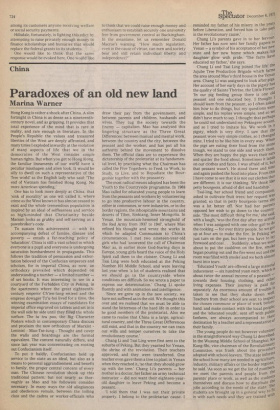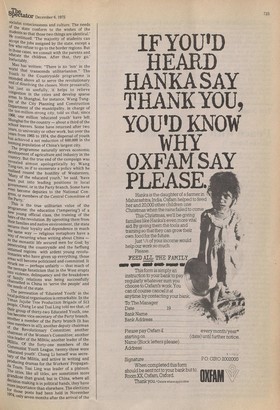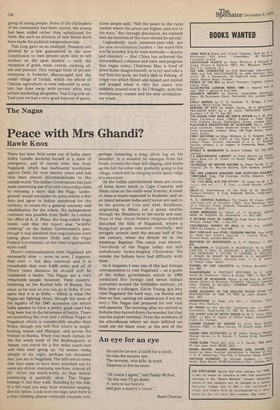China
Paradoxes of an old new land
Marina Warner
Hong Kong is rather a shock after China. A slim fortnight in China is as dense as a nineteenthcentury novel, and as gripping. It provides that total experience of the mind that is rare in reality, and rare enough in literature. In the People's Republic the values and treasured liberties of the West are deeply affronted, and many times I exploded inwardly at the violation of many aspects of life that we in th.e democracies of the West consider simple human rights. But when you get to Hong Kong, the familiar lineaments of our world have a peculiar misshapen and alien look. It would be silly to dwell on such a representative of the 'free world' as the English lady who said: 'The end of Vietnam has finished Hong Kong. No more American spending.'
One has to look more deeply at China, that 'sink of morality' as one wit called it, where crime as the West knows it has almost ceased to exist and the whole tremendous population is inspired by an ideal of selflessness and service so high-minded that Christianity beside Maoism looks as grubby and self-serving as a pawnbroker's code.
To sustain this achievement — with its accompanying defeat of famine, disease and poverty — entails a far-reaching policy of 'education'. China is still a vast school in which everyone is a pupil and everyone is undergoing saturation bombardment in propaganda. This follows the tradition of persuasion and exhortation beloved of the Confucian emperors and scholars, for in imperial China, as now, an orthodoxy prevailed which depended on understanding a number — a limited number — of set books. It was interesting to see in a courtyard of the Forbidden City in Peking, in the apartments where the great eighteenthcentury emperor Chlen-lung retired and the empress dowager Tz'u-hsi lived for a time, the winning examination essays of candidates for imperial office engraved on tablets and set into the wall side by side until they filled the whole surface. The to tzu pao, the Big Character Posters which in contemporary China discuss and proclaim the new orthodoxy of Marxist Leninist Mao-Tse-tung Thought and cover the walls and hoardings are the formal equivalent. The content naturally differs, and since last year was concentrating on rooting out Confucianism itself.
To put it baldly, Confucianism held up service to the state as an ideal, but also as a means to personal aggrandisement and benefit to family, the proper central concern of every man. The Chinese revolution shook up this traditional pattern, but not nearly as thoroughly as Mao and his followers consider necessary. In many ways the old allegiances and obediences remain, between the toiling class and the cadres or worker-officials who draw their pay from the government, and between parents and children, husbands and wives. They tug the society towards the Enemy — capitalism. Mao has analysed this lingering structure as the Three Great Differences: between manual and mental work, between the country and the city, between the peasant and the worker, and has put all his authority behind the movement to dissolve them. The official class are to experience the dictatorship of the proletariat at its fundamental level, by practising what the Chairman has called the Five Togethers: to Feed, to Work, to Study, to Live, and to Repudiate the Bourgeoisie together with the peasantry.
The most radical means adopted has been the Youth to the Countryside programme. In 1968 Mao called for educated young people to learn from the peasants and workers by volunteering to go into productive labour in the country, either in communes, or new industries, or in the border regions, the inhospitable mountains and deserts of Tibet, Sinkiang, Inner Mongolia. In Yenan, the mountain-hemmed stronghold of the Red Army from 1937 to 1947, where Mao refined his thought and wrote the works in which he adapted Communism to China's circumstances. I met two nineteen-year-old girls who had 'answered the call of Chairman Mao' as, in earlier more God-fearing days in Europe, young girls heard the voice of the Holy Spirit call them to the cloister. Chang Li and Tsai Ling were both educated at the Peking Number 101 Middle School, and were leaving last year when 'a lot of students realised that we should go to the countryside where conditions are difficult t So we wrote a paper to express our determination.' Chang Li spoke fluently and with animation and intelligence: 'Since we grew up in the new society, we have not suffered as in the old. We thought this over and we realised that we must be able to stand the bitterness of the hard life in order to be good members of the proletariat. Also we came to realise that China is a large, agricultural country, and the Three Great Differences still exist, and that in the country we can train our wills and temper ourselves to take the revolutionary course.'
Chang Li and Tsai Ling were first sent to the suburbs of Peking. But they yearned for Yenan, the shrine of the revolution. Their teachers approved, and they were transferred. One teacher even gave them a tree to plant in Yenan when they reached it, `so that they should grow up with the tree.' Chang Li's parents — her mother is a doctor, her father an army technical instructor — did not want their eighteen-yearold daughter to leave Peking and become a peasant.
'I told them that I was not their private property. I belong to the proletarian cause. I
reminded my father of his misery in the years before Liberation, and forced him to take Part in the revolutionary cause.'
Chang Li's parents gave in to her fervour. Her father has now sent her family papers to Yenan — a symbol of his acceptance of her new state and her new home which makes his daughter glow with pride. 'The facts have educated my father,' she says. Chang Li and Tsai Ling joined 'for life' the Jujube Tree Production Brigade which farms the area around Mao's third house in the Yenan
area. Chang Li was assigned to look after pigs. Her account of her early days in the pigsty has
the quality of Sainte Therese, the Little Flower: 'In our pig feeding group there is one old peasant and one educated boy. I thought I should learn from the peasant, so I often asked
him how to do things, but my questions Were simple, and his replies were simple, and so We
didn't have much to say. I thought that perhaPS he could not understand my Pekingese accent, and so I tried to imitate his. We work in a pigsty, which is very dirty. I saw that the
peasant wore very simple clothes, so I changed mine, I tried to be like him in every way. When
the pigs are eating their food from the stone
trough, we stand to one side and watch then'. When they are happy the pigs wave their ears and spatter the food about. Sometimes it lands
on our clothes and faces. I was afraid of it, but that peasant wasn't. He stood there and time
and again pushed the food into place. From this I have come to see that it is not our clothes that are different, it is our thinking. We think liXe petty bourgeois, afraid of dirt and hardship.' Tsai-ling, her school friend and companion, asked to cultivate fruit trees; her request Was granted, so that in petty bourgeois terms she was a lot better off. Nor had her parentS opposed her wish to go down to the countrY side. The most difficult thing for me,' she said,
with a laugh, 'was the first day after my arrival when I was assigned with one other girl to do
the cooking — for over thirty people. So we gat up at four am to make the fire. In Peking We just turn on the gas, but here you have to lay firewood and coal. . . Suddenly, when we were about to put the cauldron on the fire, smoke began pouring out and the fire went out and the room was filled with smoke-and we both almost burst into tears. . 'Educated Youth' are offered a large material inducement — six hundred yuan each, which'
about twice the annual income of a peasant —
towards their housing, clothing, and other living expenses. Their journey is paid fe.r
separately. An enormous amount of trouble is
taken to see that they shake down Well; Teachers from their school are sent to inspect' the chosen commune or place of work before hand, and make contact with the local peoale: and the 'educated youth', sent off with Publi,c fanfares, are always accompanied to their,. destination by a teacher and a representative at their family. The young people do not however volunteer in the straightforward way Chang Li described. In the Wusung Middle School of Shanghai, Ktl Kung-Shi, vice-chairman of the Revolution' Committee, was frank about the procedure adopted with school-leavers. 'The state infortbs the school how many are needed in agriculture: .industry, military affairs or the border regions, he said. 'As soon as we get the list of numbers' we meet the parents and people from the parents' place or work, as well as the students themselves and discuss how to distribute the jobs according to the needs of the state. TV, students are brought up in a general way to 0..1. in with such needs and they are trained wit° socialist consciousness and culture. The needs of the state conform to the wishes of the students so that those two things are identical.' He continued: The majority of students can accept the jobs assigned by the state, except a f.evir who refuse to go to the border regions. But in these cases, we consult with the parents and educate the children. After that, they go.' Ineluctably. Mao has written: "There is no 'ism' in the world that transcends utilitarianism." The Y. outh to the Countryside programme is intended above all to serve the revolutionary end of dissolving the classes. More prosaically, but just as usefully, it helps to relieve congestion in the cities and develop sparse areas. In Shanghai, for instance, Wang, Tungten of the City Planning and Construction uePartment of the municipality, in charge of the ten-million-strong city, told us that, since 1968, one million 'educated youth' have left Shanghai for the country — about a third of the school leavers. Some have returned after two years, to university or other work, but over the years from 1965 to 1974, the dispersal of youth has achieved a net reduction of 600,000 in the teerning population of China's largest city. The programme naturally serves economic deveioPment of agriculture and industry in the country. But the true end of the campaign was revealed almost apologetically by Wang Tang-ten, as if to exonerate a policy which he realised roused the hostility of Westerners. ,!'4any of the educated youth,' he said, 'have ueeri put into leading positions in local government, or in the Party branch. Some have even become deputies to the National Congress, or members of the Central Committee of the Party.'
This is the true utilitarian value of the Programme: the education ('tempering') of a
r,lien w. young official class, the training of the ews of the revolution. By uprooting them from their families and native environment, the state secures their loyalty and dependence in much the same way — religious metaphors have a
of recurring when writing about China
as the monastic life secured men for God; by Penetrating the countryside and the farflung 11.111arried regions with ardent young revoluucoaries who have given up everything, those areas will become politicised and committed. It stt ruck — perhaps unfairly — that much of .he teenage fanaticism that in the West erupts into violence, delinquency and the breakdown cli.f family relations was being successfully channelled in China to 'serve the people' and the needs of the state. I The permeation of 'Educated Youth' in the .,?cal Political organisation is remarkable. In the I enan Jujube Tree Production Brigade of 513 PeoPle, Chang Le and Tsai Ling told me that, of their group of thirty-two Educated Youth, one has become vice-secretary of the Party branch, another a member of the Party branch (it has ame members in all); another deputy chairman cf the Revolutionary Committee; another ei,lalrMan of the Women's Committee; another vle.e.-leader of the Militia; another leader of the Militia. Of the forty-one members of the 2.crittnunist Youth League, twenty-three were educated youth'. Chang Li herself was secretarY of the Militia, and active in writing and 13..,r°(11.1cirig dramas for the Workers' Propaganua Team. Tsai Ling was leader of a platoon, 'rhe titles, like all titles, are sometimes more grandiose than grand, but in China, where all ecision-making is in political hands, they have In°re importance than elsewhere. The elections ',°r those posts had been held in November '974, only seven months after the arrival of the
group of young people. None of the old leaders of the community had been ousted, the young had been added rather than substituted for them. But such an infusion of new blood must have made the political temperature rise.
Tsai Ling gave us an example. Peasants are allowed by a law guaranteed in the new Constitution to own private plots and to sell produce on the open market — with the exception of grain, meat, cotton, cooking oil, salt and peanuts. This vestigal form of private enterprise is however, discouraged and the model village of Tachai, which the whole of Chinese agriculture is now exhorted to emulate, has done away with private plots and private marketing altogether. Tsai Ling told us: 'Last year we had a very good harvest of pears. Some people said, "Sell the pears to the rural market where the prices are higher, and not to the state." But through discussion, we realised that the interests of the state should be served.'
Undoubtedly such nineteen-year-olds are the new revolutionary leaders — the word elite is to be avoided. It is by such methods — drastic and visionary — that China has achieved the extraordinary cohesion and calm and progress that reigns today. Chairman Mao is fond of down-home images himself, so to try and take a leaf from his book, we had a dish in Peking, of crispy rice which fizzed and leaped and sizzled and popped when a very hot sauce was suddenly poured over it. So I thought, with the revolutionary masses and the new revolutionary youth.



































 Previous page
Previous page